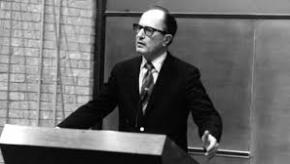Blogs
Prescription Drugs and the Effect on Access to Biosimilars in the US
The word “access” is thrown around a lot these days, particularly regarding health care and specifically, prescription medications. Access to medications essentially revolves around two things: availability and affordability. Immediately, pharmaceutical manufacturers come to mind, as they are responsible for production and setting the list price. However, ultimate availability and affordability of medications is shared with another entity. The final arbiter of access is the Pharmacy Benefit Manager. Their power resides in the fact that they control the formulary and determine the “preferred drugs” list. How does this relate to the uptake of biosimilars?Best of 2017: Across the Table: Cush & Erkan on Antiphospholipid Syndrome
The antiphospholipid syndrome (APS) is a common disorder affecting patients with and without autoimmune disease. Despite wider recognition of APS among physicians as well as the expanding research collaborations, many clinical questions are still encountered in clinical practice, which require further evidence-based studies. In this “Across the Table” edition, Drs. Cush and Erkan discuss some of these APS-related questions. Our guest expert, Dr. Doruk Erkan offers up his approach to diagnosis and management of APS.
Best of 2017: Rules for Drug Cessation with Infection
Everyone gets their education about drug-related infection risk from television ads. Rheumatologists should know what the real risks are and educate their patients that they have a higher than normal rate of nonserious infections. But the infection risk is way more related to inflammation than any specific drug risk.
Best of 2017: The Retiring Rheumatologist
Just last week, I went to a doctor’s retirement party. It was festive, with honors and ribbing for the lucky one, but there was an asterisk to his milestone. Retirement was not anticipated or planned for. What is your retirement plan?Death of the Dinner Meeting
Many years ago, rheumatologists would assemble with lunar regularity to discuss cases, journal articles or listen to a great visiting speaker or leader in rheumatology. While many of these meetings occurred at a local eatery, they were more about the meeting than the eating.
How to Present an Abstract at EULAR
Good News! Your research submission has been accepted for presentation at a national congress (i.e., ACR or EULAR). This is often a first step in the lifetime of a project – Abstract, Presentation, Full Write-up and Publication. Instead of being enthralled or overwhelmed with the notion of doing your first abstract, review my approach to creating, presenting and reviewing abstracts for a major medical meeting.
The Gender Gap in Rheumatology Leaders
Leadership positions in medicine are disproportionately filled by men. Although the enrollment of medical schools are equal male: female or even some have more women, 40% of American medical institutions lack programs for recruiting women, or for retention and promotion of female faculty.
This may also be true in rheumatology, which is now attracting more women than men as trainees. I recently wrote an article in the Lancet about mentoring women in medicine and suggested ideas for improving the gender gap in leadership.
A Busted Valise
Just because it’s busted, it doesn’t mean you have to fix it. At some point, it’s important to know when to leave “good-enough” alone. Such is the story of the "busted valise" and what to do about it.
RheumNow Celebrates Three Years
Three years ago we published our first edition of RheumNow. We have something - and someone - to celebrate. Surprise, Dr. Jack Cush - this one’s for you!
Everyone wonders how he does it. Vision. Drive. Determination. Unwavering resolve. Strength of purpose. Commitment - day in, day out. Willing to take risks. Unwilling to settle. All these, yes, but also this: passion, heart and soul.
In celebration, we asked a few of his colleagues to share their remarks about this important milestone. Without further ado…
It Begins with the Introduction
The introduction of a guest or speaker should be simple, functional and respectful. In the least, it should go something like, “I have the honor of introducing our speaker, Dr. John Brown, who comes to us from Brown University, where he is the Chief of Internal Medicine. Today he’s going to lecture on “the right way to lecture”.
However, no one does this. Instead most try to do more, usually with knowledge gaps, and end up delivering incomplete, awkward or bad introductions.
Introductions tend to either be awkward or great.










